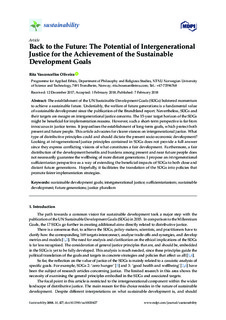Back to the Future: The potential of Intergenerational Justice for the achievement of the Sustainable Development Goals
Journal article, Peer reviewed
Published version

Åpne
Permanent lenke
http://hdl.handle.net/11250/2485812Utgivelsesdato
2018Metadata
Vis full innførselSamlinger
Sammendrag
The establishment of the UN Sustainable Development Goals (SDGs) bolstered momentum to achieve a sustainable future. Undeniably, the welfare of future generations is a fundamental value of sustainable development since the publication of the Brundtland report. Nevertheless, SDGs and their targets are meagre on intergenerational justice concerns. The 15-year target horizon of the SDGs might be beneficial for implementation reasons. However, such a short-term perspective is far from innocuous in justice terms. It jeopardises the establishment of long-term goals, which protect both present and future people. This article advocates for clearer stances on intergenerational justice. What type of distributive principles could and should dictate the present socio-economic development? Looking at intragenerational justice principles contained in SDGs does not provide a full answer since they express conflicting visions of what constitutes a fair development. Furthermore, a fair distribution of the development benefits and burdens among present and near future people does not necessarily guarantee the wellbeing of more distant generations. I propose an intergenerational sufficientarian perspective as a way of extending the beneficial impacts of SDGs to both close and distant future generations. Hopefully, it facilitates the translation of the SDGs into policies that promote fairer implementation strategies.
